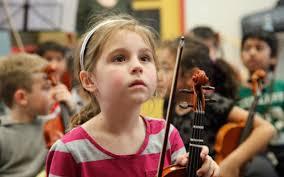Music lessons spur emotional and behavioral growth in children
"What we found was the more a child trained on an instrument," said James Hudziak, a professor of psychiatry at the University of Vermont and director of the Vermont Center for Children, Youth and Families, "it accelerated cortical organization in attention skill, anxiety management and emotional control." The cortex, or outer layer of brain, changes in thickness as a child grows and develops. Previously, Hudziak and colleagues Matthew Albaugh and Eileen Crehan found relationships between cortical thickening and thinning in various areas of the brain responsible for depression, aggression and attention problems. This research, announced last month in the Journal of the American Academy of Child & Adolescent Psychiatry, was different.
"I wanted to look at positive things, what we believe benefits child development," Hudziak said. "What I was surprised by was the emotional regulatory regions. Everyone in our culture knows if I lift 5-pound, 10-pound, 15-pound weights, my biceps will get bigger. The same is true for the brain. We shouldn't be surprised we can train the brain."
Because the study's participants were all mentally healthy children, Hudziak thinks the positive effect of music training on those who are not could be significant. "A kid may still have ADHD," he said. "It's the storm around it that improves."
Inspired by his own research, and having never learned to play an instrument, the 56-year-old Hudziak decided to take viola lessons last year.
Amy Ellis Nutt

